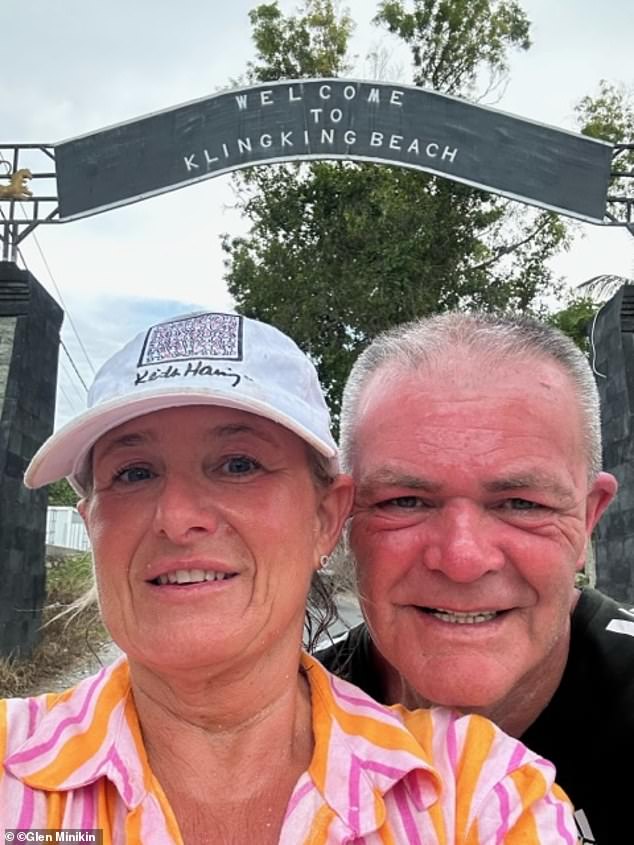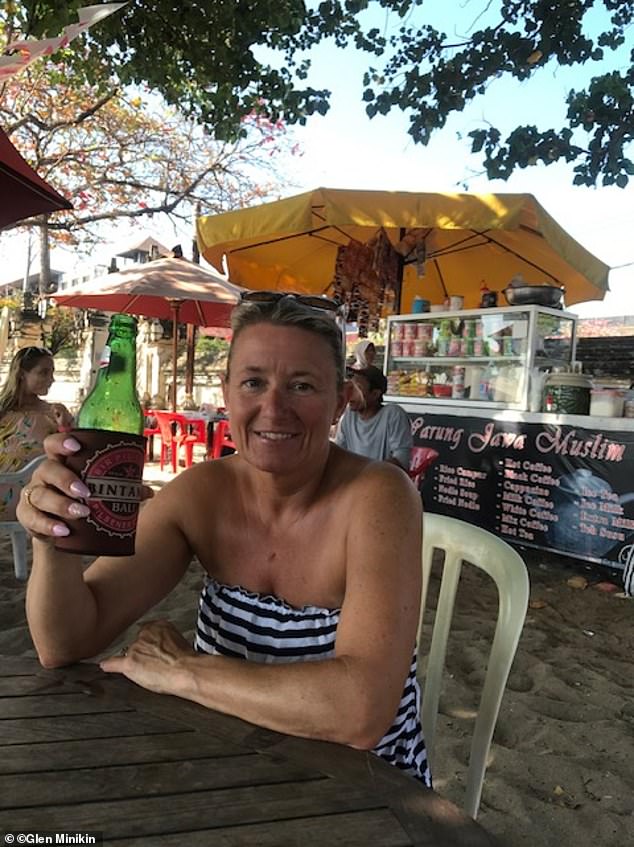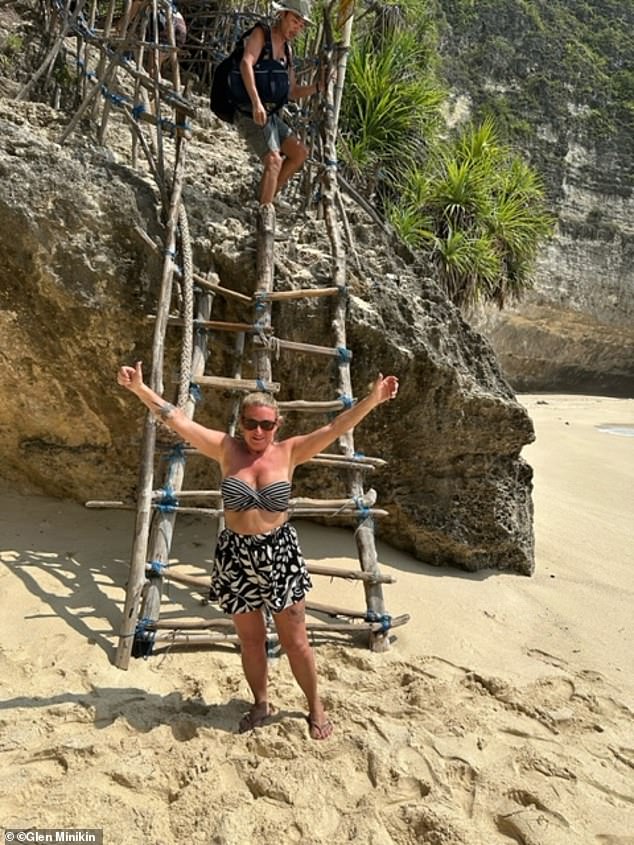Debra Morgan had just landed in the UK after a dream holiday in Bali and was exhausted, but put it down to the 18-hour flight.
However, the next morning he woke up feeling “horrible” and soon realized it was more than just post-travel fatigue.
“I was shaking and shaking and couldn’t warm up,” says Debra, 57, a dog walker from Upton, Chester. ‘If I touched my skin, it hurt. I had no energy, I had a splitting headache and my whole body ached.’
His temperature was 39°C (normal is 36°C) but a Covid test was negative.
Debra Morgan contracted dengue from a mosquito bite during a trip to Bali. Dengue is a potentially fatal infection transmitted by mosquitoes and cases are increasing among British tourists, according to data from the UK Health Security Agency (UKHSA).

Two months after the holidays, Debra still feels weak. “I love Bali, it’s our favorite destination, but this has made me more cautious,” she says.
The mother-of-three went back to bed and used her mobile to call her husband Owen, 53, an aeronautical engineer, who was downstairs, to ask for a hot water bottle because she was too weak to walk.
“I’m not exaggerating when I say that that night I felt so much pain everywhere that it felt like my organs were shutting down, and I had a strange feeling of dread, like I was dying,” Debra says.
“It was the worst thing I’ve ever been through in my life.”
The next day, Owen helped her to the GP’s office, where a nurse looked at Debra (who was now visibly sweating) and, upon learning she had been to Bali, said: “I think it’s dengue.”
Debra was sent straight to the hospital, where she spent a week taking antibiotics for a dangerously high fever.
Dengue is a potentially fatal infection transmitted by mosquitoes and cases are increasing among British tourists, according to data from the UK Health Security Agency (UKHSA).
In 2023, 634 cases of dengue were reported in tourists returning from holidays in England, Wales and Northern Ireland. This compares to 448 in 2022 and an average of 505 each year in the five years between 2015 and 2019.
Cases are also increasing globally: they increased tenfold between 2000 and 2019 and reached an all-time high last year, with 6.5 million cases and more than 7,300 dengue-related deaths.
What’s more, dengue fever is now being reported in areas once unaffected by the infection, including Croatia, France, Spain and Italy, while numbers are already triple what they were this time last year in Latin America. , a popular luxury vacation destination.
The infection is transmitted by the bite of a female mosquito. And while for 75 per cent of patients, according to UKHSA public health consultant Dr Philip Veal, it causes no symptoms, or only mild symptoms, others will develop a sudden high fever.
Fever is usually accompanied by severe headaches and pain behind the eyes, muscle and joint pain, nausea, vomiting, abdominal pain and loss of appetite.
These cases should also resolve within a few days with paracetamol to help with temperature and pain (anti-inflammatories such as ibuprofen should not be used as they can cause bleeding problems if you have dengue).
However, about 5 percent of patients, like Debra, will develop severe dengue with more extreme versions of the symptoms, which can include “breakbone fever,” which can cause severe joint pain and bleeding, and although this is little Common among tourists, it can be fatal.
An analysis published in the Journal of Travel Medicine in 2021 reported on nine people, with an average age of 32, who died of dengue between 1995 and 2020 after vacations in Mexico, Ecuador, Malaysia and Thailand.
“Severe dengue is more common in children, adolescents, older people, and pregnant women,” Dr. Veal told Good Health.

When Debra and Owen left for Bali for a 16-night holiday in February, they only brought insect repellent as they thought they would be safe where they were staying in exclusive locations.
“It is also seen in people with certain underlying conditions, such as asthma, diabetes, obesity, high blood pressure, kidney disease, bleeding disorders, and in those taking blood-thinning medications (blood thinners).”
“This is because any bleeding can quickly become serious for someone taking blood thinners that prevent blood from clotting.”
While the infection is most common in South and Southeast Asia, the UKHSA is warning of an increase in cases among those returning from the Caribbean and Central America. (In Argentina, cases are so high that people have been panic-buying mosquito repellent and supermarket shelves have been empty for weeks.)
What’s more, says the UKHSA, dengue is already “an emerging disease outside the tropics, including parts of Europe.”
“Aedes aegypti (the mosquito that causes the majority of dengue cases worldwide) is currently established in Cyprus, around the Black Sea and in the outermost region of Madeira,” says Dr Veal.
“Aedes albopictus (a type that causes most infections in Europe) is established in much of Europe,” he adds.
«In southern Europe, specifically in Italy, France, eastern Spain and the eastern coast of the Adriatic Sea, the mosquito has established itself and is progressively spreading towards the northern latitudes of Europe.
“This is because Aedes albopictus can establish itself in more temperate regions, tolerates mild winters and its eggs can survive temperatures as low as -10ºC.”
Dr. Veal says multiple factors are driving the rise in cases, including “increased global travel, climate change expanding the geographic range of Aedes mosquitoes, and urbanization, with densely populated areas providing ideal locations.” for reproduction”.
Measures to prevent dengue include using insect repellent containing 50 percent DEET and covering exposed skin. Air conditioning can also help, as mosquitoes prefer warm, humid conditions.
It is believed that sleeping under an insecticide-treated mosquito net is not as effective in preventing dengue, since the Aedes mosquito, unlike other types, also bites people during the day.
When Debra and Owen left for Bali in February for a 16-night holiday, they only brought insect repellent as they thought they would be safe where they were staying in luxurious places.

During her nights in Bali, Debra remembers being bitten by mosquitoes. ‘I could feel them all over my arms and legs, even though I had used spray’
“Some people take anti-malaria pills to go to Bali, but we don’t find it necessary,” says Debra.
On March 11, they took a boat from Bali to the nearby island of Lombok, and when their return boat was canceled due to rough seas they decided to sleep at the ferry terminal.
‘We had nowhere to stay and wanted to be sure we would be ready when the sea was calmer, as our flight home would be in three days. So we and other tourists decided to sleep in the port, on the ground, on our suitcases.’
During the night, Debra remembers being bitten by mosquitoes. “I could feel them all over my arms and legs, even though I had used spray.”

The mother-of-three, 57, is a dog walker from Upton, Chester. She said contracting the disease was “the worst thing I’ve ever been through in my life.”
The next day they were able to return to their hotel and then spent another two days in Bali before flying home.
Debra felt sick within hours of arriving home in Chester.
She recalls: ‘I felt so bad that I actually posted in a Bali travel Facebook group where I saw a post about dengue. I had never heard of it, so I asked if anyone else had had it.
‘Someone responded that it was widespread and that she had had it and that it took about four days to incubate. I looked back and it had been exactly four days since I slept on the floor of the ferry port and got bit so bad.’
Following the nurse practitioner’s advice, Owen took Debra to the hospital, where she was given intravenous fluids as a precaution while they waited for blood test results.
‘I also had ECG (tests to check the electrical activity of the heart) as my heart rate was all over the place. They also did a chest x-ray. Then they told me they would send my blood to a special laboratory for tropical diseases to test for dengue.
After seven hours, he was allowed to return home, but he returned the next day because his temperature had skyrocketed. Debra was readmitted and given more antibiotics, and she spent the next week battling fever and pain.
“I was so sick that I lost half a kilo in a week and felt very weak,” she says.
“After that, my fever finally disappeared and I felt better, but for several days I was left with a terrible headache that no medication could relieve.”
Two months later, Debra still feels weak. “I love Bali, it’s our favorite destination, but this has made me more cautious,” she says.
She still wonders why her husband wasn’t affected. But Dr. Veal says some travelers are at greater risk than others, although it’s not clear who or why.
“The fact is that everyone who travels to countries where dengue is endemic is at risk,” he says. “It is crucial that people protect themselves.”
For more information visit travelhealthpro.org.uk

